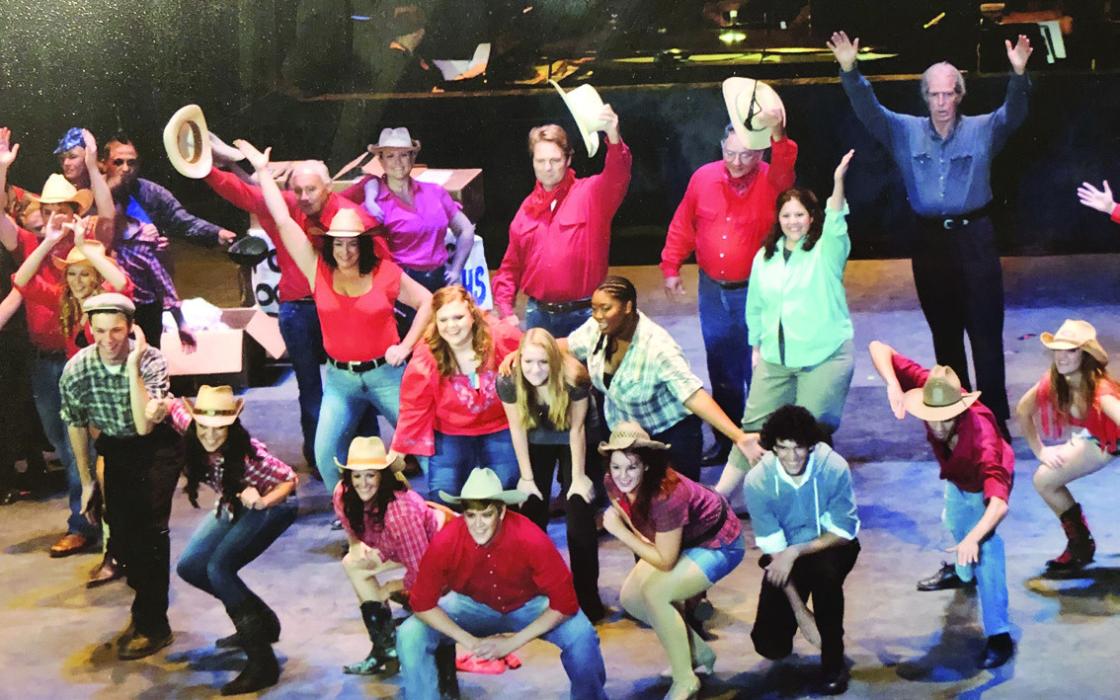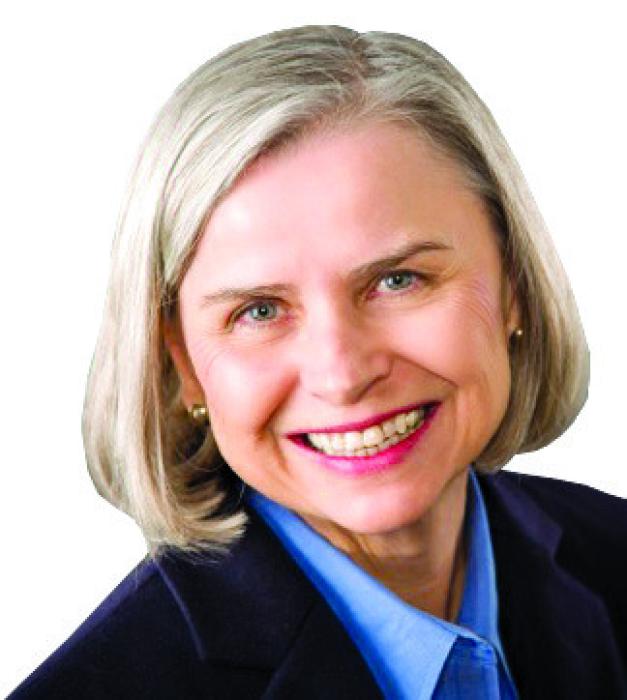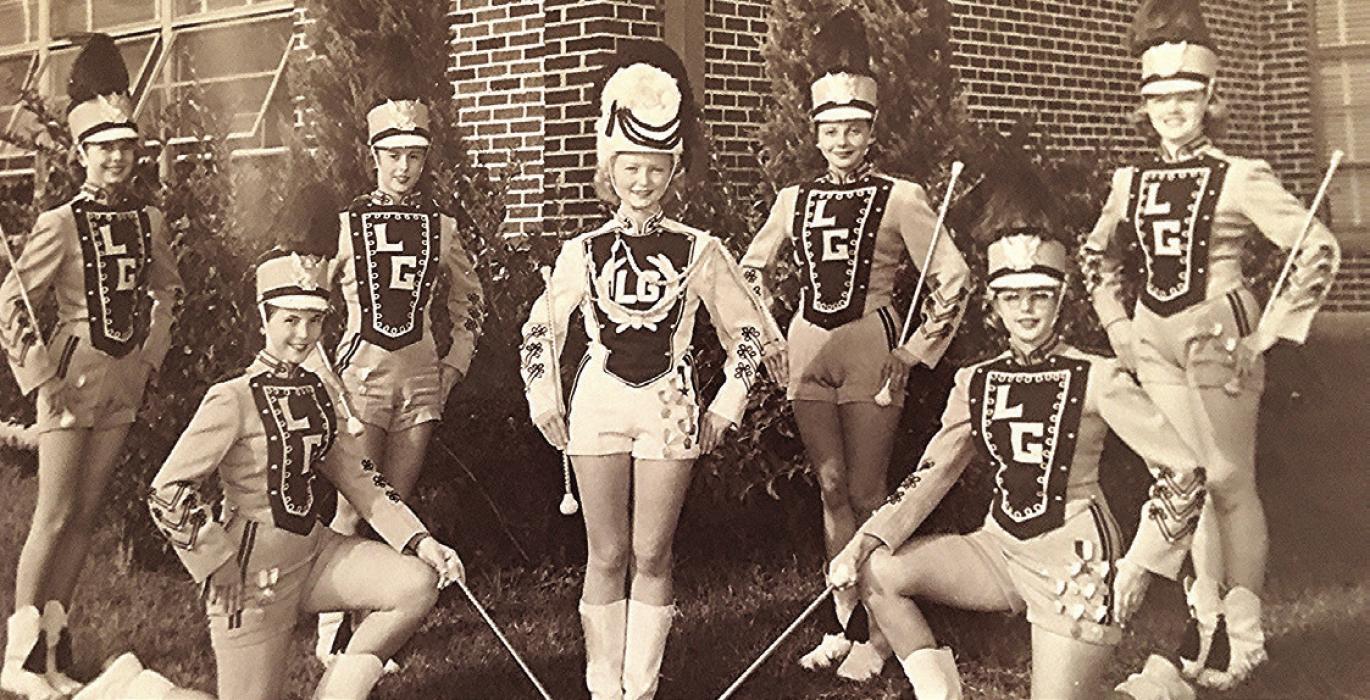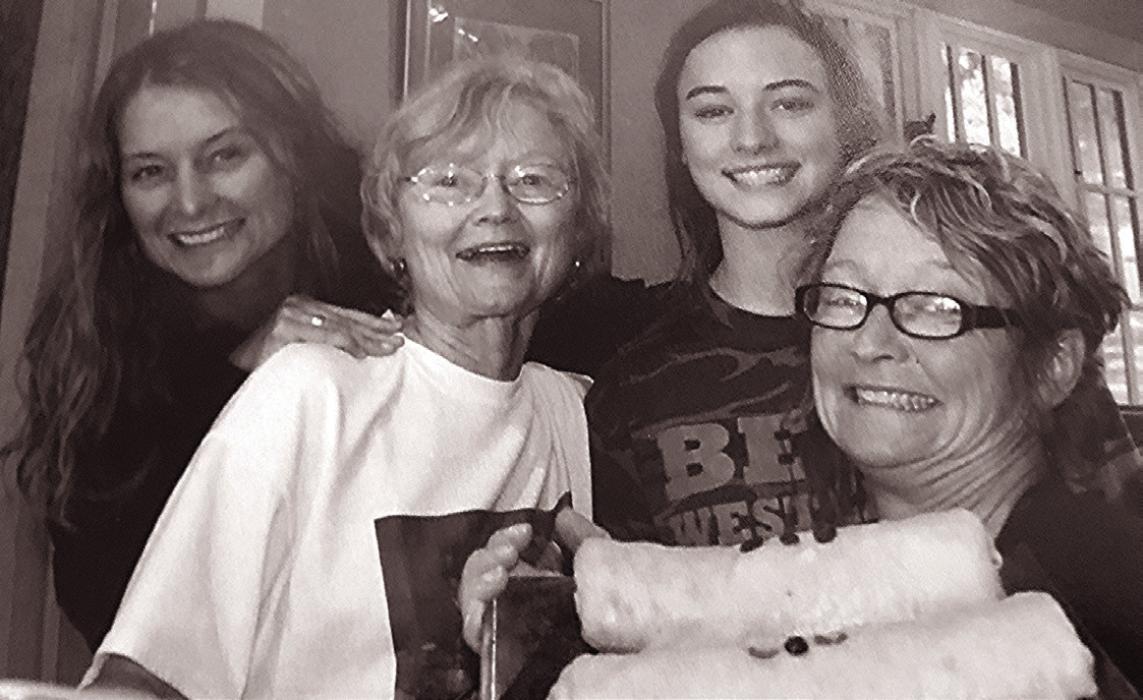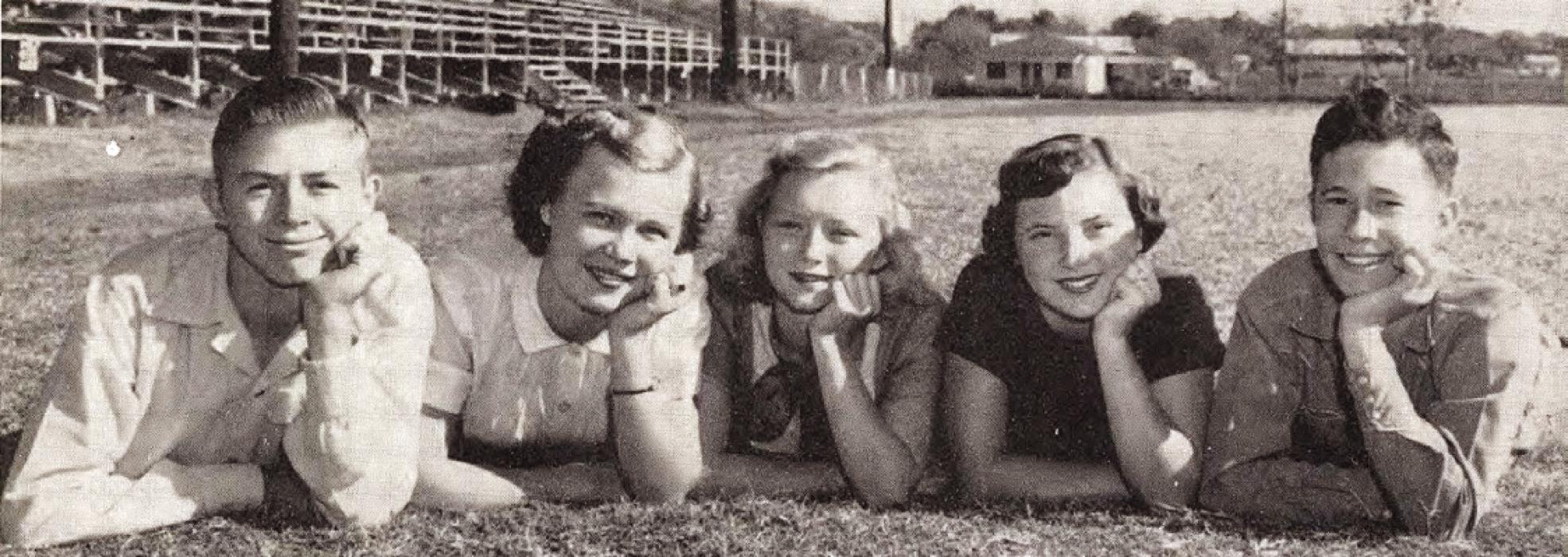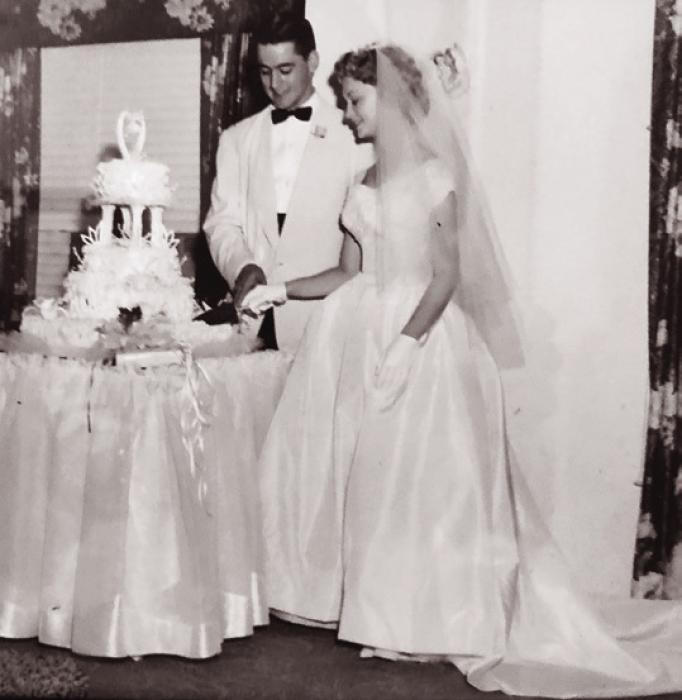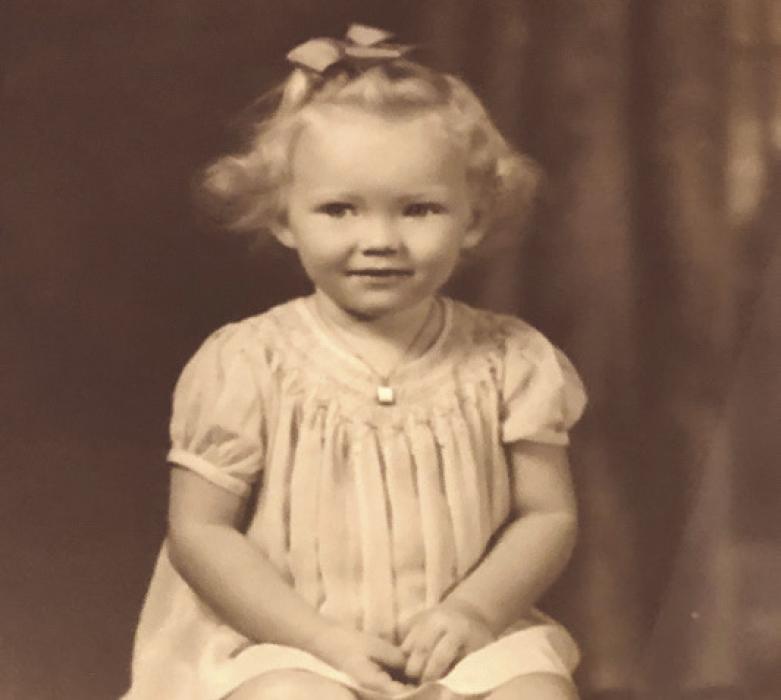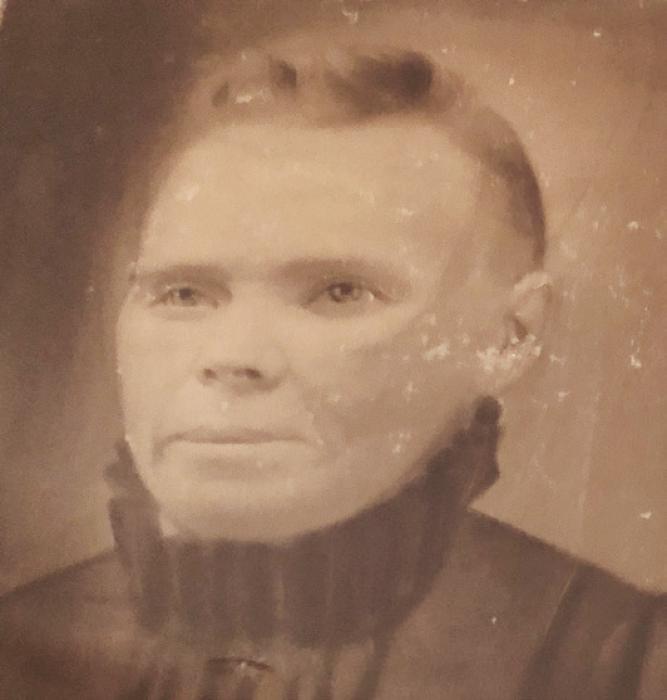Insatiable Wanderlust Sparked Growth, Discovery and Fulfillment for this 3rd-Generation Fayette Co. Native.
Virginia Leech could have been born at Fayette Memorial Hospital in 1938 with an innate sense of adventure. Then again, perhaps spending the first four years of her life above La Grange’s old fire station is what fueled her curiosity.
“My dad, Frank Mika, was a volunteer fireman and we lived in an upstairs apartment in the southwest corner of what is now called the Historic Casino Hall. Every time there was a fire, there was great excitement and activity.
“Now and then when things were a little quiet, I’d hop on the stairwell railing and ride it downstairs to plop on a fire engine. We also had a window that faced the railroad track, so I’d wave at the oncoming trains and the engineers would blow their whistles and wave back,” Virginia says.
The family later moved to a house in the Riverside edition of La Grange before Virginia started school at Sacred Heart Catholic School. At the time, her father was a barber on the Square and Virginia’s mother, Agnes, stayed home to look after her husband and daughter.
On the lawn of the fire sta-tion, Agnes washed the towels used at Frank’s barbershop with a wringer washing machine and hung them to dry on outdoor firehose racks.
The Mikas were part of a large, close-knit Fayette County family. When she was a small child, Virginia recalls her paternal grandmother, Agnes Baca, putting her in the car on Sunday afternoons. They’d drive all over the county visiting kin, most of whom lived on small farms. Virginia also recalls they almost always were served delicious homemade kolaches. Virginia’s grandmother urged her to marry a Czech boy and learn to speak Czech.
“I didn’t listen to my grandmother. I told her, ‘I am American.’ I can only think how hurtful my words must have been,” Virginia’s dad purchased the Martin Bordovsky ‘recreation’ building on the south side of the Square. He had operated Frank’s Place, a popular cold drink business in the Bordovsky building, since 1941, as well as another bar next door. Frank’s Place was where Czechs from across Fayette County had gathered for decades to talk about crops, weather, politics and other debated topics.
When Virginia’s father was diagnosed with polycystic kidney disease, he sold the Frank’s Place business to John Korenek and Frank C. Vacula. “My dad loved to travel. He said he only felt good when he was traveling. So before I was 12 years old, we visited all 48 (at the time) state capital cities in the country. I had my picture taken on the steps of every one of them. I think that’s where my love of travel started,” Virginia notes. Her father died at the age of 43 in 1952, two years before Virginia started high school.
La Grange High School was a good experience for Virginia, even though she was very shy at first, and her fair skin turned embarrassingly crimson for no reason during most conversations.
In addition to her studies, Virginia played clarinet in the band, became the Leopard Band’s drum major, participated in Future Homemakers of America, played basketball and supported the school sports teams. Her nickname was Mickey and her memorable teachers were Mr. J.G. Banik, Mr. Ernest Clark and Miss Rosa Meineke.
“I loved our school newspaper, called the Hi-Standard. We put it out after school under Mr. Banik’s supervision. We’d turn the crank on the mimeograph machine to make copies of the pages. I was co-editor of the paper with Lorraine Janak Balzer.
“I think that’s where my love for journalism started,” she says.
The summer after she graduated, Virginia got a job with an insurance agency on the Square. Her plan was to enroll at Durham’s Business College in Austin when classes started in the fall.
“Back in the 1950s, girls who wanted a career had to be prepared to be a secretary, nurse or a teacher.” On his deathbed, Virginia’s father had asked her mother to take Virginia to Austin to school and live with her. ‘She needs to be a teacher,’ he said. When she heard her Dad’s request, Virginia wasn’t impressed. She was so young that she wanted to become an airline hostess or a roller-skating waitress delivering hamburgers to customers. “The last thing I wanted to do was to become a teacher.
“When I didn’t like working as a secretary, I listened to a La Grange friend, Mary Ruscher, who was attending Southwest Texas, now Texas State University. I liked what she said about college and called my friend, Bill Lemmons, who was attending that school. Two weeks later, he picked me up at 6 a.m. in a driving rain, and that was my first experience in college.” Within three years, Virginia had transferred to the University of Texas and earned a Bachelor’s degree with majors in journalism and English, along with a teaching certificate. When Virginia didn’t find a decent-paying job in journalism, she talked to a recruiter from the Spring Branch School District near Houston. “He asked me if I was from La Grange and I said yes. Next, he wanted to know if I was Czech and when I said yes, he said I was hired because he knew that being Czech, I would be a workaholic.” Four months into her first job in Spring Branch, Virginia met a young man named Ed Leech after Mass at St. Anne Catholic Church in Houston. Ed, who was from Dallas, was employed by the telephone company in the Houston area. Virginia and Ed fell for each other.
At Sacred Heart Catholic Church in La Grange on July 23, 1960, they married. Their family was complete with the births of daughters Kelly and Dana. “Parenting two daughters has been life-changing. It’s an endeavor of love with family visits, camaraderie and support that keeps on giving. And the gifts keep coming with grandchildren Austin, Allie and Conner, and most recently, greatgranddaughter Charley.”
To follow Ed’s career path, they moved to Beeville, Texas, San Antonio and St. Louis, Missouri. In St. Louis, Virginia taught in Montessori School in order for Kelly and Dana to experience that education.
Upon the family’s return to Dallas, Virginia taught in public school. She also earned a Master’s degree in liberal arts from Southern Methodist University.
For the next 11 years, Virginia taught journalism and English at Richland College, a job that provided her with opportunities to work with students from all areas of Dallas and media professionals whom she hired to work as instructors and mentors to the students. “It was very rewarding. I was advisor to the student newspaper and a kind of glue among the students, faculty and professional reporters and photographers who came into the classroom from their newsrooms. Every semester, I had a whole new staff whose purpose was to put together a quality newspaper that served the college community,” Virginia adds.
One of her proudest moments came in 1993 when the Richland Chronicle won the Associated Collegiate Press Award for the national community college’s best of show category. (Newspapers in California, New York and Arizona won second, third and fourth places.) The Associated Press of Texas awarded the Richland Chronicle its highest award: best newspaper of any college or university in the state of Texas. During her teaching career, Virginia relied on a method of grading papers she had learned in high school from Miss Meineke, her high school teacher back home in La Grange.
“Miss Meineke would read through a paper and put a red dot by everything she wanted to talk to you about. That method worked well for me, too,” Virginia recalls.
During their 62-year marriage, Ed and Virginia have visited all seven continents.
“I remember a friend’s response when I said we were going to Antarctica. He suggested we throw a bedsheet over the dining room table and look at it. That’s how he envisioned Antarctica - a white wasteland of
snow and ice. “However, we found Antarctica to be a very dramatic, exciting place with ice flows, mountains and icebergs that looked like sculptured ice. When the sun shone, colors were reflected in all hues. With different shapes and colors, it was like being in an art gallery. “And the animals! The whales, sea lions and seals were gigantic in size, and the penguins were just such sweet, playful birds.”
As volunteers in 1998, Ed and Virginia traveled to Egypt with the International Executive Service Corps, a part of the Agency for International Development. There, Virginia volunteered with the Episcopal Church in resettling Sudanese refugees who had been forced out of neighboring Sudan because they were Christian.
Later, after they returned home, the couple stepped up to assist young Sudanese refugees whom the government had settled in Dallas. Virginia and Ed helped them come from the dark ages of the third world to begin work and their formal education. For the Leech’s efforts, the Sudan youth fondly referred to them as ‘Mama’ and ‘Baba.’
More recently, Virginia served on the board for the Fayette County Disaster Relief Team. She was present when a representative for Samaritan’s Purse cited the important work of La Grange citizens, especially that of Joy and Steve Cameron, who had worked tirelessly to help victims of Hurricane Harvey. He pointed at Joy and said, ‘You can expect a $3 million check in the mail.’ That started the project now known as Hope Hill.
Writing fiction was never part of Virginia’s long-range plans. After retiring from Richland College, she was adjunct instructor at the University of Texas at Dallas where she encountered some former students. They recommended a writing course. “So I thought, yes, I want to do more freelance writing in retirement and this class would be helpful,” she says. Virginia didn’t realize until after the class had started that Dr. Nelson’s course was on writing fiction rather than journalistic non-fiction. She thought the professor was exceptional, so she stayed to learn that the chapter titles to each student’s novel were due the following class period. The class period after that, the first chapter was due. It was a challenge that interested Virginia.
“Since I had not written fiction, I had to come up with an idea. I remembered a story told by my dad’s cousin. It was about Joseph and Anna Psencik, my great-grandparents, in Fayette County. So I started writing that story about my ancestors’ immigration to Texas. “By the end of the semester, the story became historical fiction that I continued to work on and think about for the next 17 years.”
With their daughters and grandchildren living in nearby Austin, Virginia and Ed decided to make their retirement home in La Grange, a decision they have never regretted. Not long after their move, a casual conversation with La Grange attorney Bill Schovajsa, who was working out on a treadmill next to her at the country club, gave Virginia the nudge to take the next step with her novel.
“When Bill asked me to put something on the amphitheater stage at the Texas Czech Heritage Center in La Grange, I laughed and said I knew nothing about the theater. “By the time I reached home after that conversation, I decided that La Grange needed a play about its history. Besides that, I knew that libraries had volumes of books on 19th century Czech immigration. My book couldn’t really add to that.” After three years of learning and hard work, Virginia turned her historical novel into a play. Although she met with professors at drama departments at Texas and Oklahoma universities, she had no clear-cut direction on how to bring it to the stage. Then a University of Texas professor told Virginia what she needed to hear. “Stage plays in America don’t work unless they are musicals,” he said. Virginia had played the clarinet in high school and had been a twirler in the Longhorn band at the University of Texas, but she knew that didn’t qualify her to create a musical. She needed help. An answer came from La Grange residents, retired Houston professionals Carolyn Franklin, who came from the theater, and Dick Smith, a musician and former advertising executive. Carolyn came out of retirement to direct the play that Virginia had written, and Dick realized his lifetime goal of writing a Broadway musical.
“During the time that all of this was finally coming together, Ed and I would attend programs at Festival Hill at Round Top where “Heart of the Tin Trunk” was to be presented. We’d count the people in attendance. Could we get 200 or 300 people to come to our Czech play, we wondered?” Virginia recalls.
“Heart of the Tin Trunk” debuted in July 2011 with sellout performances staged over two consecutive weekends. After the first night’s performance, a meaningful assessment was overheard at Latte on the Square in downtown La Grange. ‘What about that play at Festival Hill?’ a gentleman asked his fellow coffee drinkers, affectionately called ‘The Geezers.’ One responded, ‘You would have loved it. It was just like the “Sound of Music!”’ In 2012, popular demand brought the Texas musical back. Approximately 9,000 people bought tickets for the play’s fourweek run over two summers.
“All my life I carried around those ignorant words that I spoke to my grandmother about not needing to speak Czech because I am American,” Virginia says.
“It took some years of growing, but I have learned to deeply appreciate the importance of the rich Czech culture that Grandma tried to teach me. All I can do is look up and hope my grandmother is looking down to see that “Heart of the Tin Trunk” is her lesson to me.” What about grandmother’s request that Virginia marry a Czech boy? “Grandma should know that the German boy whom I married is as committed to the preservation of Czech culture as I am,” Virginia says. Grandmother Agnes Baca would be pleased.
For more stories, please visit www.elainethomaswriter.com/ blog/ and sign up to receive new posts or call Elaine at 979-263-- 5031.

